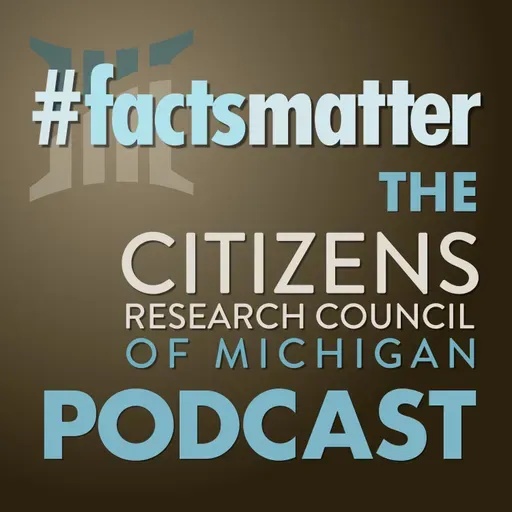
13 February 2025
Would Reforming the Use of Earmarks in Statute Be the End of Pork as We Know It?
#FactsMatter, the Citizens Research Council of Michigan podcast
About
John Lindstrom and Bob Schneider discuss a topic that has been popping up increasingly among Michigan lawmakers lately: transparency and reforming the use of budget earmarks … especially “11th hour” earmarks.
Lindstrom, a former reporter, editor, and publisher of Gongwer News Service, and Schneider, senior research associate for state affairs at the Citizens Research Council recall the history of end-of-session budget earmarks.
“This is nothing new,” said Lindstrom. “I mean, you go back to when I first started covering the legislature when dinosaurs still roamed the earth. The last session day before Christmas, it was well understood that there was a bill called grants and transfers, which was known in the legislature as the “Christmas tree bill.”’
While ham is often associated with traditional Christmas dinners, Christmas tree bills/11th-hour earmarks are always associated with pork.
Eighteen months ago, Schneider reviewed and wrote that over 65 percent of over $1.3 billion in earmarks in the FY2024 “omnibus” budget bill were “eleventh-hour earmarks” that appeared only in the final bill – not in the Executive Budget or in the House- or Senate-passed budget bills.
$1.3 billion in unseen, non-public, non-transparent spending of state taxpayer dollars.
He wrote at the time that the legislature should move to improve “front-end” transparency and vetting by providing upfront details on sponsored earmarks and respecting legislative rules that should prohibit these eleventh-hour earmarks.
Since then, it has become noticeably clear that the best way to prevent these earmarks is through restrictions in statute.
“The downside to earmarks is that they, you know, they're sort of politically motivated rather than most often policy or policy motivated,” Schneider says. “The best place for these earmarked protocols would be to put them in state statute so that they are part of permanent law.
“We know the legislature -- both parties and both chambers with Republicans in charge, with Democrats in charge -- have ignored their own rulemaking at times and the courts don't really have any way to deal with that.”
Lindstrom, a former reporter, editor, and publisher of Gongwer News Service, and Schneider, senior research associate for state affairs at the Citizens Research Council recall the history of end-of-session budget earmarks.
“This is nothing new,” said Lindstrom. “I mean, you go back to when I first started covering the legislature when dinosaurs still roamed the earth. The last session day before Christmas, it was well understood that there was a bill called grants and transfers, which was known in the legislature as the “Christmas tree bill.”’
While ham is often associated with traditional Christmas dinners, Christmas tree bills/11th-hour earmarks are always associated with pork.
Eighteen months ago, Schneider reviewed and wrote that over 65 percent of over $1.3 billion in earmarks in the FY2024 “omnibus” budget bill were “eleventh-hour earmarks” that appeared only in the final bill – not in the Executive Budget or in the House- or Senate-passed budget bills.
$1.3 billion in unseen, non-public, non-transparent spending of state taxpayer dollars.
He wrote at the time that the legislature should move to improve “front-end” transparency and vetting by providing upfront details on sponsored earmarks and respecting legislative rules that should prohibit these eleventh-hour earmarks.
Since then, it has become noticeably clear that the best way to prevent these earmarks is through restrictions in statute.
“The downside to earmarks is that they, you know, they're sort of politically motivated rather than most often policy or policy motivated,” Schneider says. “The best place for these earmarked protocols would be to put them in state statute so that they are part of permanent law.
“We know the legislature -- both parties and both chambers with Republicans in charge, with Democrats in charge -- have ignored their own rulemaking at times and the courts don't really have any way to deal with that.”
